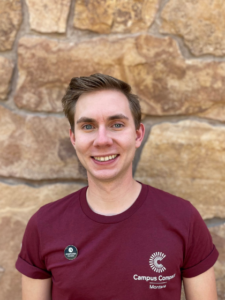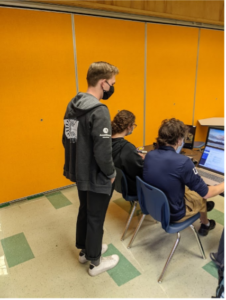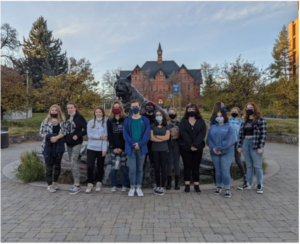Learning, Healing, and Other Two-Way Streets By Noah Aukerman

For much of my life, the societies I have lived in have conceptualized learning as an activity with two primary actors; the learner and the teacher, with the former understood to be somewhat dependent on the latter in this model. However, this season of my life has been marked by repeated realizations that the world cannot be fully understood through the lens of these categories we create to make sense of things.
As an AmeriCorps service member serving with TRIO Upward Bound and Talent Search at Montana Tech, I find myself in the role of one who participates in the education of youth, specifically high schoolers. As a recent university graduate hoping to continue my education at the graduate level in the future, I know myself to be a learner. I have come to notice a learned tendency I have to set aside one of these identities in favor of the other in a given context. I have begun to reflect on why this might be. Why do I see myself as less of a learner when I am lending my energy to another person’s educational journey?
Education and learning form one (very important) part of the broader reality of personal growth, another vital part of which is healing. For me, learning and healing are inextricably linked, often occurring in tandem with one another. Good education equips us not only with knowledge of the world, a heightened awareness of salient social issues, and a greater capacity to confront them, but also with a greater capacity for introspection and addressing issues and afflictions we encounter within the landscape of our own thoughts and emotions. It is for this reason that I firmly believe there is a place for learning, and an important one at that, in the way we understand healing. However, again, as with learning, I tend to bisect my concept of the healing process into two roles; that of the one who is offering support in the healing process and that of the one who is in need of healing. Again, I tend to cast myself into just one of these roles at a time.
I am not always cognizant of these dichotomous systems of thinking. But, like many other learned or conditioned systems of thinking, over time they have become engrafted into the way that I see the world and situate myself in it. It is with increasing frequency that I find myself encountering situations or experiences wherein I become aware of and am forced to reevaluate these systems.

Recently, in dialogue with a student, I became aware, really for the first time, of my aforesaid notions regarding learning and healing. Their OnTrack (online college preparatory work) module for the day was about fostering healthy study practices. Throughout the module the importance of self-confidence was strongly implied, prompting them to reflect on the ways people who occupy positions of influence in their life have, through various actions and words, caused them to experience invalidation. We discussed the impact of this on their learning habits and their struggle to establish boundaries while navigating feelings of guilt fueled by negative responses to initial attempts at boundary setting. It was then I shared a personal story of a time that I had experienced invalidation from an influential figure in my life, and how I dealt with it. The story I shared was recent and the wound was fresh. Yet as I shared it, my student and I both found a form of solidarity. Together we were able to ask the question; ‘how has my need for healing informed my pursuit of learning?’ In that moment and from the insights we shared with one another, we each learned something about ourselves, about our hurt, and about how to move forward. I do believe we both inched forward on the journey of healing. Our conversation also helped me realize that my role as an AmeriCorps service member, helping others in their process of learning, does not exist apart from my identity as a learner, but rather is rooted in it.
I am beginning to understand that healing and learning are far more interactional than transactional. They are not merely things that one administers to another but are interpersonal and mutual.

Commenting on the interplay between social and individual identity Dr. Resmije Kryeziu writes “…each lofty purpose is comprised of a series of smaller purposes, like a mosaic which derives its beauty from the broad spectrum of its component parts” (Akti i Krijimit, 2011, p. 101). Students’ education is certainly a lofty purpose. Yet it exists as part of a much broader, much more remarkable purpose; that of holistic human growth and development. Ultimately, our concern must be for the whole person, their healing, their wellness, their professional success, and the list goes on. Growing, healing, and learning are two-way streets. To succeed in supporting students in these areas requires a level of vulnerability from those of us who mentor students as well. Through the avenue of civil service, we as AmeriCorps service members are able to serve this entire “mosaic” of purpose that binds us together. In the process, we too find that we are enriched.
 Blog
Blog